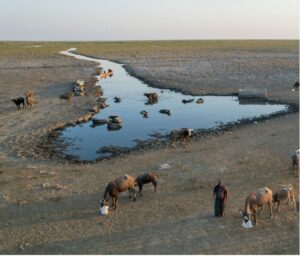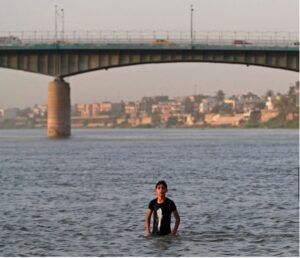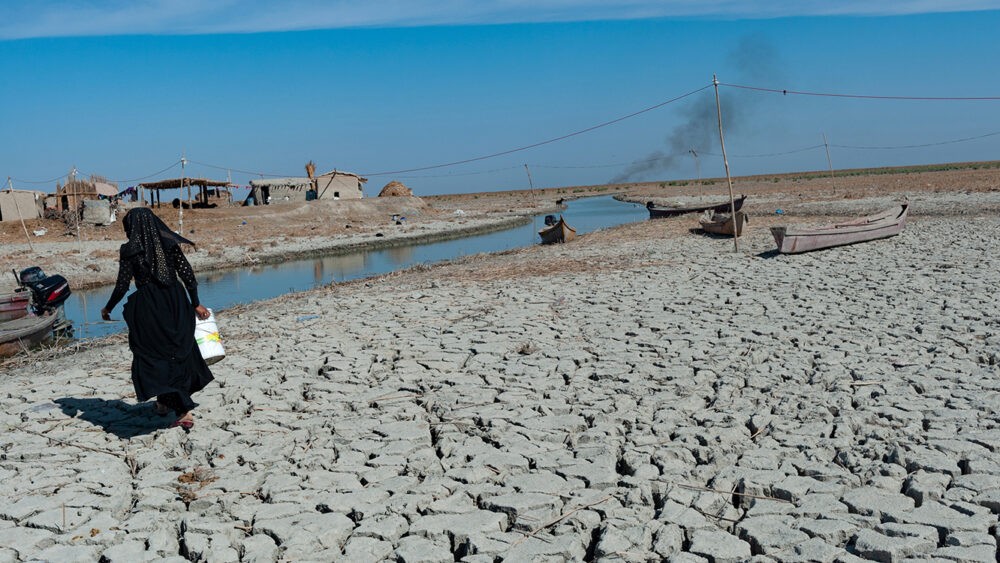In his article, Hussam Sobhi highlights Iraq’s urgent need for updated legislation to address the growing challenges of climate change, as the country faces severe droughts, rising temperatures, and a looming water crisis that could displace thousands by 2030. Despite these threats, Iraq’s environmental laws, particularly the 2009 Environmental Protection Law, remain outdated and insufficient. Sobhi underscores the global push for stringent climate laws and the need for Iraq to follow suit, noting efforts to revise environmental policies and create frameworks to mitigate climate impacts and promote sustainability. Without swift legislative action, Iraq risks further environmental and economic deterioration.
Iraq is grappling with economic, political, and social challenges due to the disruptions caused by the climate crisis. The country is being hit by severe droughts and unprecedented temperature increases. More than 130,000 people in southern Iraq have been forced to abandon their homes and livelihoods over the past seven years. It is estimated that half of Iraq’s water resources could be lost by 2030, according to both national and international assessments. Meanwhile, provinces like Basra are witnessing a worrying rise in cancer cases, largely attributed to the catastrophic impact of the oil industry.
Despite this, a striking gap exists between the magnitude of these challenges and Iraq’s legislative framework. The country’s laws are limited to the Environmental Protection Law of 2009, even as the rest of the world is implementing strict laws and educational policies to combat such challenges.
Article 27 of Iraq’s 2009 Environmental Protection Law mandates the “protection and improvement of the environment by eliminating and addressing damages to public health, natural resources, biodiversity, and cultural and natural heritage.” However, the law makes no mention of climate change or its impacts, even as Iraq experiences a severe climate crisis, including water scarcity, desertification, rising temperatures, and forced migration.
Neither the legislative nor the executive institutions have taken serious steps to update the Environmental Protection Law since its passage in 2009. This signals a failure to address new environmental challenges, insufficient responses to crises threatening public health, and the sustainability of the country’s natural resources and biodiversity.

A view of livestock at the Marshes as the area dries up due to increasing temperatures and lack of rainfall in Nasiriyah, Iraq on July 09, 2023 (Photo by Haidar Mohammed Ali/Anadolu Agency via Getty Images).
The 2009 law was passed six years after the Ministry of Environment was established, during a period of restructuring of government institutions following the 2003 regime change. At the time, the ministry was responsible for setting environmental policies, enforcing regulations, and monitoring pollution. However, the ministry’s staff lacked adequate expertise during that period.
For Iraq’s legislators, environmental issues were a novel topic. Complicating matters further, the country was in the midst of sectarian conflicts and serious security concerns between 2003 and 2009, which also had devastating effects on the economy and living conditions.
Global Legal Efforts to Combat Climate Change
Countries around the world are implementing laws, treaties, and agreements to confront climate change and mitigate its impacts. Among these efforts are international agreements such as the Paris Agreement, adopted by 190 countries in 2015 to reduce emissions, as well as the Kyoto Protocol and the United Nations Framework Convention on Climate Change. Locally, many nations have enacted legislation to curb the effects of climate change. The U.S., for example, passed the Inflation Reduction Act in 2022 to encourage green projects. The UK’s Climate Change Act of 2008 was the first in the world to set legally binding emission reduction targets—80% by 2050 compared to 1990 levels—recently updated to align with global carbon neutrality goals.

An Iraqi youth strolls through the receding waters of the Tigris River in Baghdad on July 12, 2023. (Photo by Ahmad AL-RUBAYE / AFP) (Photo by AHMAD AL-RUBAYE/AFP via Getty Images).
The European Climate Law, adopted in 2021, is one of the most successful climate laws globally. It commits the EU to achieving carbon neutrality by 2050 and reducing emissions by 55% by 2030 compared to 1990 levels. It also includes strict mechanisms to monitor and promote investments in renewable and clean energy.
Germany is another global leader in enacting environmental and climate change legislation. The country has developed a comprehensive legal framework with over 30 laws and regulations governing various aspects of environmental protection and climate change management.
Where Does Iraq Stand in Global Progress?
Dr. Khadija Al-Jabri, an expert in agriculture and climate, explains to “New World,” that the agricultural sector is the most affected by climate change in Iraq due to unpredictable weather patterns disrupting crop production.
Al-Jabri highlights that “extreme temperatures and declining seasonal rainfall have reduced the country’s agricultural land by 17 to 50%. Following agriculture, water resources are the second hardest hit, with water scarcity being a critical issue, especially in southern Iraq. This has also led to significant harm to biodiversity in the region.“
Regarding climate change mitigation and the role of national laws in addressing the resulting crises, Al-Jabri adds that “including climate change provisions in Iraq’s environmental protection laws could significantly strengthen efforts to enhance sustainability by establishing a strong regulatory framework for mitigation, promoting adaptation strategies, improving institutional capacities, creating economic opportunities, and directly addressing existing challenges.“
By prioritizing these measures now, Iraq can work towards a more sustainable future that balances environmental safety with social and economic development.
Dr. Ramadan Hamza, a water policy and strategy expert, stresses the importance of Iraq’s commitment to international agreements, such as the Paris Agreement and biodiversity treaties, to strengthen its stance against climate change and reduce greenhouse gas emissions.
Hamza notes that domestic laws, such as the current Environmental Protection Law, can indirectly contribute to combating climate change by compelling institutions and society to address its impacts. He also emphasizes that strict environmental laws at the local level could enhance adaptation and mitigation efforts, setting specific standards for managing natural resources and development projects, while imposing penalties or obligations for environmental violations, thereby strengthening compliance with local laws.

Dried out palm trees by the receding waterline of Lake Habbaniyah affected by severe drought in Iraq’s Anbar province, on August 29, 2024. (Photo by AHMAD AL-RUBAYE / AFP) (Photo by AHMAD AL-RUBAYE/AFP via Getty Images)
New Climate Legislation in Iraq: From Imitation to Innovation
Ibrahim Mahdi Al-Sudani, an academic and permanent member of Iraq’s climate change negotiation delegation, recounts Iraq’s journey towards establishing new climate laws. He explains, “When the Environmental Protection Law was first drafted, Iraq lacked environmental and climate change experts. So, we borrowed from the experiences of neighboring countries like Jordan and Saudi Arabia, studying their laws to develop a national law that reflected the region’s practices at the time.”
Al-Sudani notes that Iraq’s actual work on climate issues began after 2015 following the Paris Agreement. The country established the National Climate Change Center under the Ministry of Environment, which began its operations alongside the Paris Agreement. This led to the formation of Iraq’s National High Committee for Climate Change, involving most of Iraq’s ministries.
Following the COVID-19 pandemic in 2020, Iraq agreed to update its environmental laws or draft a new law that could provide the legal framework to address climate change crises, fund adaptation projects, and reduce emissions. As a result, a specialized committee of legal experts and representatives from the Climate Change Directorate was formed to revise the existing law under the supervision of the Minister of Environment, Nizar Amidi.
Sudani reveals that the updates will modify over 50% of the current law, transforming it into a new law. He adds, “We are now awaiting the draft of the new law, which will be put to a vote in Parliament next year.” He also mentions the inclusion of legislation to establish a Carbon Economics Company, an executive body for environmental projects, carbon trading, emission reductions, and more.
Consultant lawyer Hussam Raad Al-Bahadli points to the necessity of conducting a thorough analysis of Article 27 of the 2009 Environmental Protection Law to determine whether it is sufficient to address contemporary climate challenges. He argues that secondary regulations should be examined to ensure the law incorporates all necessary measures to combat climate change and promote renewable energy use.
Bahadli adds that while Iraq’s laws have become more flexible and open to new legislation, the challenge lies in gaining government approval, particularly when these laws could impact the economy and society.
Iraq at a Crossroads
Omar Abdul Latif, executive director of the Green Iraqi Observatory, warns, “Without decisive climate legislation, Iraq is on the brink of an environmental disaster. Desertification is devouring our lands, the water crisis is choking agriculture, and drought is forcing farmers and villagers to abandon their homes for cities already burdened by displaced populations.”
Abdul Latif adds, “With rising temperatures and polluted air, diseases are spreading rapidly, overwhelming an already struggling healthcare system. The Iraqi economy is deteriorating due to climate change, with mounting losses. These effects could plunge even more Iraqis into poverty and unemployment.“
He concludes by emphasizing that Iraq stands at a critical juncture: “The country must act quickly to adopt stringent climate legislation to avoid a bleak future, or risk being trapped in a vicious cycle of intertwined crises, suffocating any hope for a better tomorrow.“
This article was originally published by the ‘New World’ on September 30, 2024 (Link).
![Iraq Climate Change Center [IC3+]](https://iraqclimatechange.org/wp-content/uploads/2024/06/logo2.png)

